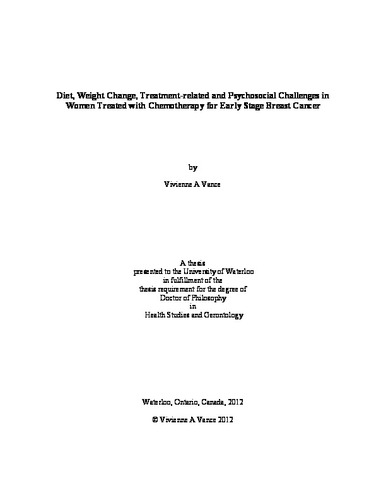| dc.description.abstract | Background: Weight gain, fat gain and loss of lean tissue are common among a growing population of breast cancer survivors. These unfavourable changes in body composition are distressing for many women and may lead to metabolic disturbance, increased risk of obesity-related disorders and poorer prognosis. Although data are accumulating on the adverse health effects of obesity and weight gain in this population, relationships between acute and chronic effects of treatment, dietary change and weight gain after diagnosis are poorly understood.
Objectives: The purpose of this thesis was to gain an appreciation of the experience of food intake and body weight over the treatment trajectory, from the perspective of women who have received chemotherapy for breast cancer. Study 1 was designed to explore the unique challenges associated with chemotherapy in relation to diet and weight management and to investigate possible relationships among psychosocial and treatment-related factors, dietary intake and weight gain during treatment. Study 2 was a follow-up to study 1, within the same study population. The purpose of study 2 was to investigate relationships among persistent side effects of treatment, diet and weight gain since the completion of chemotherapy treatment.
Methods: Twenty-eight early stage breast cancer survivors, who were within 12 months of completing chemotherapy, were recruited from four regions in southwestern Ontario, to participate in comprehensive qualitative interviews, identify changes in diet since diagnosis, provide 3-day food records and complete validated surveys to assess current (past week) symptoms of physical and psychological distress. Demographic, medical, treatment and weight history were collected via questionnaire. Current weight was measured at the time of interview.
Results: The mean weight change during treatment (mean = 15±4 weeks) was +0.8± 4.6 kg (range = -12.3 - +9.1). Among women who gained (n=11) or lost (n=6) >2.0 kg during treatment, the mean weight change was + 5.1 and -5.2 kg, respectively. Based on the recalled experiences of women, who were on average 6.4±4.4 months from completing chemotherapy treatment, food intake during treatment appears to be highly responsive to treatment day, with most women reporting lower food intake and irregular eating patterns for the first few days after treatment. Women who lost weight during treatment tended to report more severe and persistent side effects of treatment, leading to a more prolonged reduction of food intake after each cycle. Increased appetite, food cravings and intake of energy dense comfort foods seemed to be more common among women who gained weight during treatment. In these women, changes in taste, nausea and emotional distress were central in promoting these dietary responses. Most women reported a reduction in physical activity during treatment.
The mean weight change from the completion of chemotherapy treatment to the time of interview was -0.4± 3.2 kg (range = - 6.0 - +5.2), with six women gaining (mean=3.5 kg) and seven women losing (mean=5.1 kg) > 2.0 kg during this time frame. Most women (84%) reported changes in diet after diagnosis. Dietary changes were largely consistent with current recommendations for cancer prevention, however some women were still above the guidelines for total and saturated fat and many were below recommendations for vegetables/fruit and milk/alternatives. Based on the EAR cut-point method, the prevalence of inadequate calcium and vitamin D intakes from foods was high (47-96%). Although symptoms were highly variable, the mean levels of physical and psychological distress in this sample were similar to previous reports among early stage breast cancer patients in active treatment and appear to be markedly higher than previous reports of distress among cancer-free adults. Fatigue duration (proportion of daytime) was negatively correlated with weight change after treatment
(r = -0.46, p<0.05).
Conclusions: While the etiology of weight change in this population is complex, findings from this study suggest that food intake and dietary patterns may play an important role for some women. A theoretical model based on qualitative analysis supports several pathways by which psychosocial factors and treatment-related side effects might influence diet and eating patterns in ways that promote weight change during treatment. Relatively high levels of physical and psychological distress after treatment suggest that these symptoms may persist for many breast cancer survivors in the first year after completing chemotherapy, and may associate with weight change during this time frame. Data on dietary change and current dietary habits highlight several possible targets for intervention in this population. Understanding the unique challenges related to diet and weight management after diagnosis, in the context of psychosocial and treatment-related factors, may serve to inform future research and to guide the development of effective diet and weight management interventions after diagnosis. | en |

